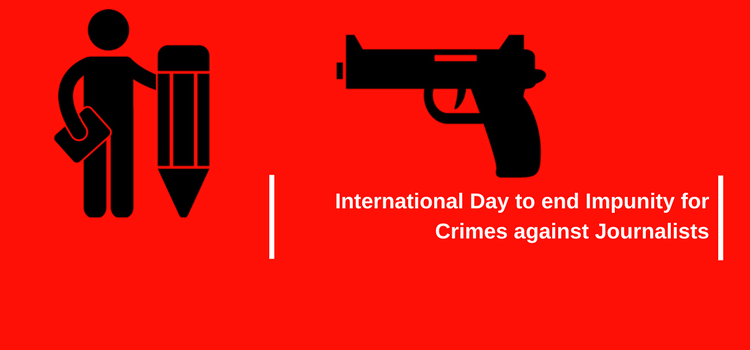
The Human Rights Network for Journalists-Uganda (HRNJ-Uganda) would like to join the rest of the world in commemorating the 10th International Day to End Impunity for Crimes against Journalists.
To us, this day serves as a touching reminder of the countless journalists in Uganda who risk their lives to report the truth, often in the face of adversity.
The Background
The United Nations General Assembly declared November 2 as the International Day to End Impunity for Crimes against Journalists in 2013, recognizing the vital virtue of safeguarding journalists’ rights, and the protection of the fundamental freedom of expression.
Uganda’s Reality
In Uganda, journalists face harassment, intimidation, arbitrary detention, violence, and even death. The country’s media landscape is still marred by impunity, with perpetrators of crimes against journalists rarely held accountable.
The HRNJ-Uganda’s Annual Press Freedom Index (PFI) report, which compilation profiles Human Rights violations committed against journalists in a given year, has perennially indicated that perpetrators are state actors mainly security forces.
Despite efforts to identify the perpetrators of crimes against journalists, they are often left to go scot-free, which promotes impunity among the culprits to maintain their violent behavior towards journalists.
We believe this culture of impunity undermines democracy, transparency, and accountability.
Consequences of Impunity
The effects of impunity against journalists in Uganda are far-reaching:
- Self-censorship and silenced voices
- Limited or no access to information
- Compromised democracy and accountability
- Increased violence and harassment against journalists
“Journalists are the guardians of democracy, and their safety is paramount, and therefore, the brazen impunity against them is a threat to our collective freedom,” Robert Ssempala, the Executive Director of HRNJ-Uganda said, “the Government must prioritize journalists’ safety and protect their rights. We cannot afford to lose the truth-tellers in our society.”
It should be recognized that impunity against Journalists is not a unique catastrophe for Uganda, but a global crisis, that is on the accelerated rise.
According to a statement issued by the United Nations (UN) Secretary-General on the occasion to observe the 10th DEI, “worldwide, an estimated 9 out of 10 journalist murders go unpunished. Impunity breeds further violence. This must change.”
Recognizing its global character, it needs to summon collective energies to work towards stamping out of the impunity in our communities, globally.
Otherwise, HRNJ-Uganda remains committed to defending journalists’ rights to freedom of expression and creating an environment where impunity against journalists is a risky venture. We will continue to provide strategic legal, medical, and psychosocial support to the media practitioners injured during their duty.
Recommendations to the Government
HRNJ-Uganda believes that a future where journalists report without fear, where truth flourishes, and where the stories that need to be told are shared with courage and integrity is possible.
It is against this we, therefore, use the day to recommend the following:
- Investigate and prosecute crimes against journalists promptly and effectively
- Enforce policies guaranteeing journalists’ safety, especially during crises and emergencies
- Respect press freedom and freedom of expression
- Implement the African Union’s Declaration of Principles on Freedom of Expression and Access to Information
- Support the United Nations Plan of Action on the Safety of Journalists

